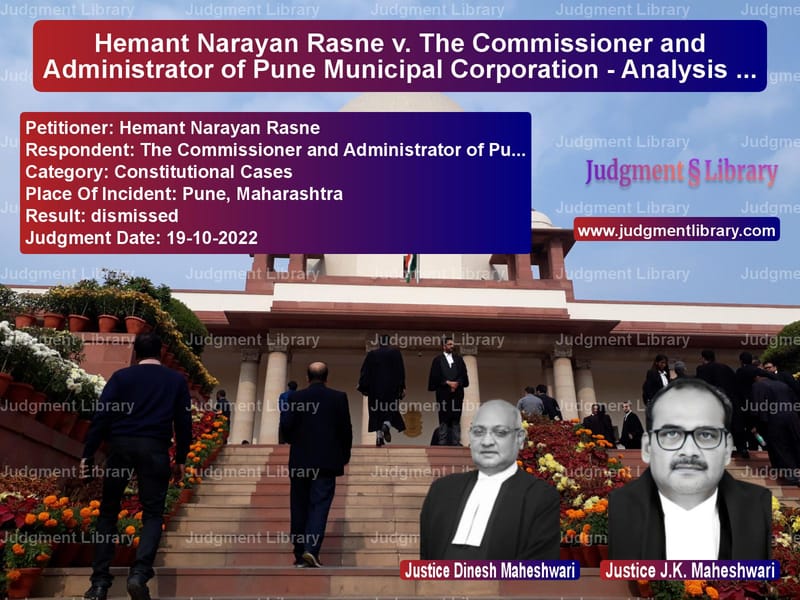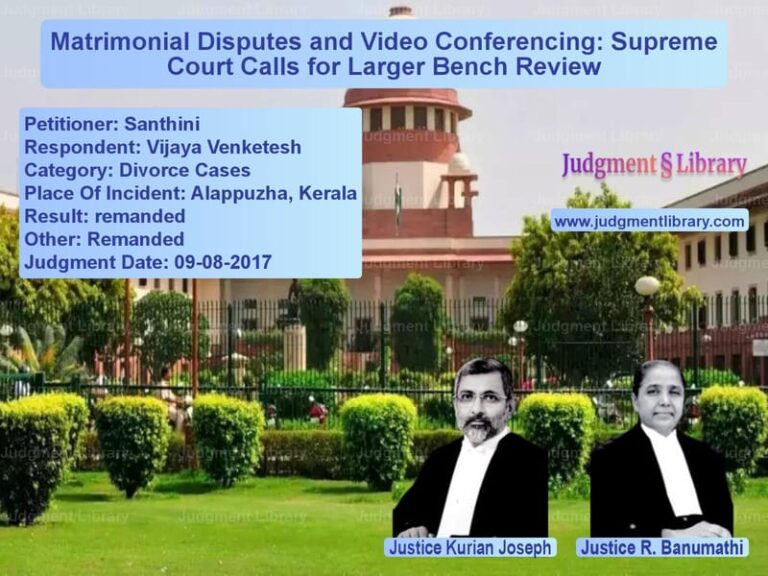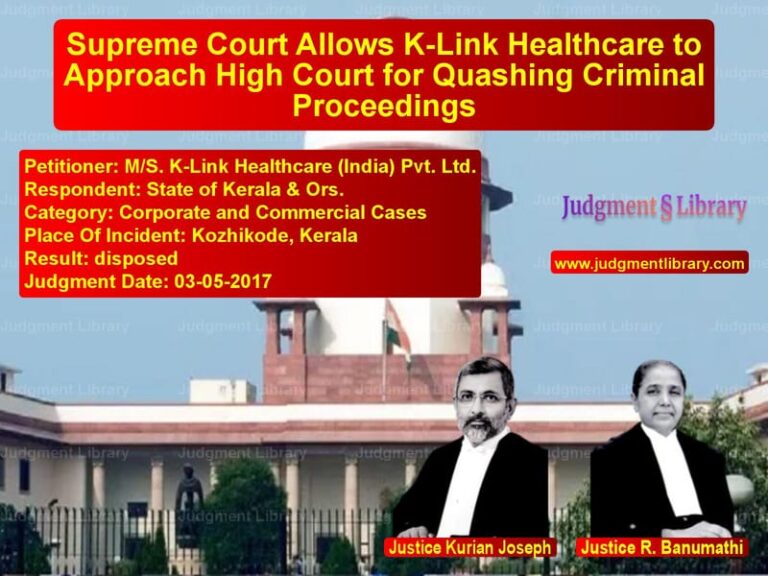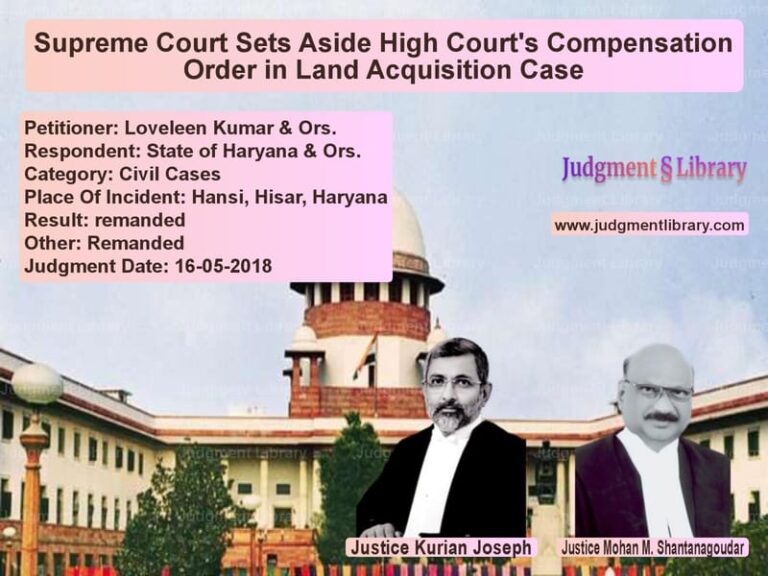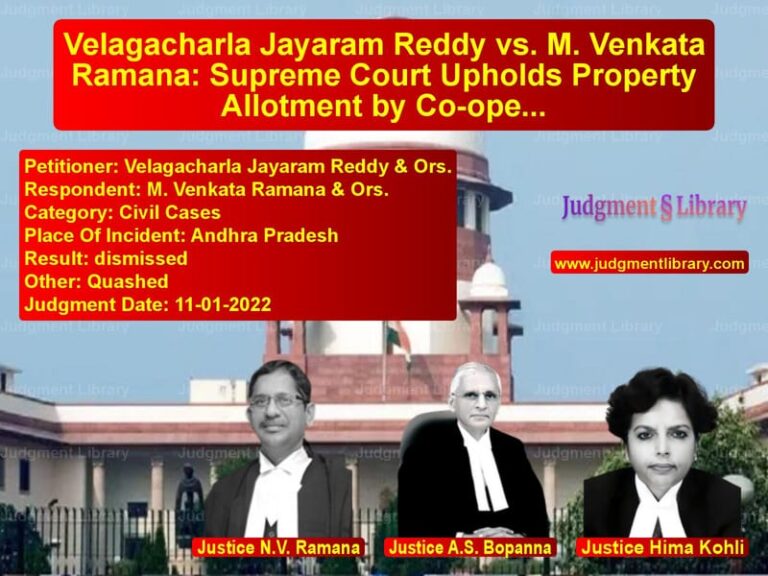Hemant Narayan Rasne v. The Commissioner and Administrator of Pune Municipal Corporation – Analysis on Standing Committee Functioning Post Term
The case involves Hemant Narayan Rasne, the appellant, challenging the order passed by the High Court of Bombay, which dismissed his writ petition seeking the continued functioning of the Standing Committee of the Pune Municipal Corporation even after the completion of its tenure. The appellant, as the newly elected Chairman of the Standing Committee, argued that the Standing Committee should continue to function despite the expiry of the term of the Municipal Corporation, while the government had appointed an administrator for the corporation.
The primary issue in this case is the interpretation of the Maharashtra Municipal Corporations Act, 1949, with regard to the term of the Standing Committee and whether it can continue to function after the tenure of the Corporation ends. The government had issued an order on 03.03.2022, appointing the Commissioner of Pune Municipal Corporation as the administrator, after the tenure of the Corporation ended on 14.03.2022. The appellant contends that the Standing Committee should still be allowed to function and perform its duties, while the government disagreed and contended that the appointment of an administrator was in line with the law.
Petitioner and Respondent Arguments
Petitioner’s Arguments:
- The appellant, represented by learned Senior Counsel, Shri Gopal Sankaranarayanan, argued that the Standing Committee should continue its functions until the election of a new committee after the general elections. The appellant emphasized that, as per the Maharashtra Municipal Corporations Act, 1949, the Standing Committee had a distinct legal status and its functioning was not necessarily tied to the term of the Municipal Corporation. The appellant further pointed out that the continuation of the Standing Committee was vital for the effective governance and functioning of the municipal body.
- The petitioner also referred to Section 20(3) of the Maharashtra Municipal Corporations Act, arguing that the proviso to this section allowed the members of the Standing Committee to retire only after the election of a new committee. Therefore, it was the appellant’s view that despite the end of the Corporation’s term, the Standing Committee should continue to function until a new one was appointed.
Respondent’s Arguments:
- The respondents, represented by learned Senior Counsel, Shri Jayanth Muthraj, opposed the appeal and argued that the provisions of the Maharashtra Municipal Corporations Act, 1949, clearly stated that the tenure of the Standing Committee was co-terminus with the duration of the Municipal Corporation. The respondents referred to Section 6A and Section 452A of the Act, which mandate that the term of the Standing Committee and the office of its members end with the completion of the Corporation’s term.
- The respondent also emphasized that once the tenure of the Municipal Corporation had expired, and the Administrator had been appointed to take charge, the Standing Committee ceased to function. The respondents contended that there was no provision in the Maharashtra Municipal Corporations Act, 1949, that allowed the Standing Committee to continue functioning post the end of the Corporation’s term.
Key Issues and Supreme Court’s Ruling
The Supreme Court examined several key issues in this case:
1. Standing Committee’s Continuation Post Term of the Corporation
The central issue in this case was whether the Standing Committee could continue to function after the term of the Municipal Corporation ended. The Court emphasized that the Maharashtra Municipal Corporations Act, 1949, explicitly states that the term of the Corporation and the term of the Councillors are limited to five years. The Court also highlighted that when the term of the Corporation ends, so does the tenure of the Councillors, and consequently, the Standing Committee, which is composed entirely of Councillors, ceases to exist.
The Court further noted that Section 452A of the Maharashtra Municipal Corporations Act provides for the appointment of an Administrator to take over the functions of the Corporation once its term expires. The Court held that the Standing Committee, in this context, could not continue to function after the expiration of the term of the Corporation and the cessation of the Councillors’ terms. The Court dismissed the appellant’s argument that the Standing Committee should continue its functions, finding it inconsistent with the statutory provisions.
2. Constitutional and Statutory Provisions Governing the Term of the Corporation
The Supreme Court reviewed the provisions of the Maharashtra Municipal Corporations Act, 1949, and the relevant constitutional provisions, including Article 243U(1) of the Constitution of India. The Court found that the term of a Municipality, including the Pune Municipal Corporation, is clearly defined to last for five years, and the Standing Committee’s tenure is inherently tied to that period.
The Court ruled that the proviso to Section 20(3) of the Maharashtra Municipal Corporations Act, which the appellant relied upon, does not extend the life of the Standing Committee beyond the term of the Corporation. The Court emphasized that the scheme of the Act, especially the absence of any provision similar to Section 48 of the Bombay Municipal Corporation Act, 1888, further substantiated the conclusion that the Standing Committee’s term ends with the term of the Corporation.
3. Administrator’s Role in the Absence of the Standing Committee
The Court also examined the role of the Administrator in the absence of a functioning Standing Committee. The respondents argued that the appointment of an Administrator was in line with the provisions of the Maharashtra Municipal Corporations Act, 1949, which allowed the Administrator to take over the powers and duties of the Corporation. The appellant’s contention that the Standing Committee should continue its functions was dismissed by the Court, which upheld the constitutional and statutory provisions that prioritize the appointment of an Administrator to perform the duties of the Corporation once the term expires.
Conclusion
The Supreme Court dismissed the appeal and upheld the decision of the High Court of Bombay, affirming that the Standing Committee could not continue to function after the term of the Pune Municipal Corporation had expired. The Court emphasized that the statutory provisions of the Maharashtra Municipal Corporations Act, 1949, clearly dictated that the term of the Corporation and the Councillors was limited to five years, and that the Administrator appointed by the State Government would take over the functions of the Corporation after the expiration of its term.
The Court’s ruling reflects the importance of adhering to the constitutional and statutory framework governing municipal bodies and their functioning. The decision reinforces the principle that the continuation of the Standing Committee is inherently linked to the term of the Corporation, and once the Corporation’s tenure ends, so does the role of the Standing Committee.
Impact and Implications
This ruling has significant implications for the functioning of municipal bodies and the role of elected officials in the post-tenure period. It clarifies that once the term of a municipal body ends, the Standing Committee ceases to function, and the Administrator takes over the powers and responsibilities of the Corporation. The decision also serves as a reminder that the provisions of the law must be followed strictly, and there can be no extension of a committee’s powers beyond the prescribed term of office for elected members.
Petitioner Name: Hemant Narayan Rasne.Respondent Name: The Commissioner and Administrator of Pune Municipal Corporation & Ors..Judgment By: Justice Dinesh Maheshwari, Justice J.K. Maheshwari.Place Of Incident: Pune, Maharashtra.Judgment Date: 19-10-2022.
Don’t miss out on the full details! Download the complete judgment in PDF format below and gain valuable insights instantly!
Download Judgment: hemant-narayan-rasne-vs-the-commissioner-and-supreme-court-of-india-judgment-dated-19-10-2022.pdf
Directly Download Judgment: Directly download this Judgment
See all petitions in Fundamental Rights
See all petitions in Constitution Interpretation
See all petitions in Separation of Powers
See all petitions in Public Interest Litigation
See all petitions in Judgment by Dinesh Maheshwari
See all petitions in Judgment by J.K. Maheshwari
See all petitions in dismissed
See all petitions in supreme court of India judgments October 2022
See all petitions in 2022 judgments
See all posts in Constitutional Cases Category
See all allowed petitions in Constitutional Cases Category
See all Dismissed petitions in Constitutional Cases Category
See all partially allowed petitions in Constitutional Cases Category

